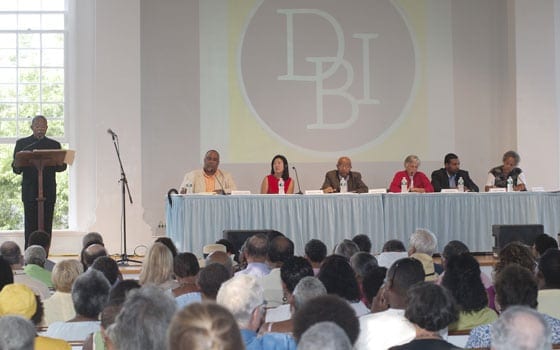
EDGARTON, Mass. — When Michelle Rhee joined a panel of experts on Martha’s Vineyard to discuss the achievement gap in public education, there was no doubt that she would be a lightning rod in the discussion.
She shared the stage with education historian Diane Ravitch, Harvard sociologist Lawrence Bobo, Yale psychiatrist James Comer and Princeton sociologist Angel Harris, and soon enough she was taking fire from all sides.The panel was sponsored by Harvard University’s W.E.B. Du Bois Institute, which is headed by Henry Louis Gates Jr.
For the past 15 years, these summer seminars have been an annual ritual at President Barack Obama’s favorite vacation island, and they draw a cross section of vacationing intellectuals — black, brown and white. The president was a few miles away but, of course, did not attend.
Rhee’s 3½-year reign as chancellor of District of Columbia Public Schools ended in controversy. She resigned soon after her boss, Mayor Adrian Fenty, was upset in the 2010 election by City Council Chairman Vincent Gray.
The conventional wisdom was that Rhee’s tough approach to the D.C. schools’ problems — including firing teachers and principals and closing schools — had alienated the city’s black middle class. Her claims of dramatically improved test scores during her tenure have since been disputed.
Soon after the elections, Rhee gave up Washington, D.C., for Sacramento, Calif., where her fiance, former NBA All-Star Kevin Johnson, is mayor. She also created a new organization, StudentsFirst.org, to advocate on behalf of kids in the school-reform debate.
She sat down for an interview in the basement of the Old Whaling Church in Edgartown, Mass., right after last week’s panel discussion.
The name of your organization implies that children are not first in the minds of educators.
You have teachers’ unions. You have testing companies. You have textbook manufacturers. You have lots of people who are benefiting every day from maintaining the status quo.
If you go to any school board meeting anywhere across the country, the number of times that people mention children, or students, or student achievement is very, very few.
Most of the issues that are debated, that are at the forefront, are adult issues. If we took the stance of saying, “What is in the best interest of kids? What decisions would we make if we were just thinking about children and their families?” we would have a much, much different public policy.
The discussion got quite heated when you talked about removing poor teachers from the classroom.
People on the panel suggested that if someone is rated as ineffective, let’s try to invest in that person. That’s nice if you’re looking at it from a systemic perspective. But I wanted to ask every one of those panelists: “Would you allow your child to be in that person’s classroom while we try to professionally develop them?”
There’s not a person on that panel or anywhere in the audience that would allow that to happen. So whose children are we expecting to be in the classroom year in and year out?
There was a lot of pushback from people on the panel about the idea of getting rid of bad teachers or of testing kids. Is it resistance to accountability or resistance to the idea?
I think a lot of what happens on panels, there’s a bogeyman [created] and the debate gets polarized. Diane Ravitch said, “I believe in accountability.” Dr. Bobo said afterward, “I also believe in accountability.”
You get everybody on the panel saying accountability is important; testing is important. If we all agree accountability and testing are important and we all agree we don’t want either of those things to get out of hand, what does the right testing regimen look like? What does the right accountability system look like?
That’s where I feel we’re going to get into some real solutions and real meat of the debate, as opposed to throwing out these big things which I don’t see anyone out there saying.
Some of the things Dr. Ravitch talked about: the need for music and art and PE.
Those were all things we did for the first time in Washington, D.C., when I was the chancellor. That’s what makes it difficult because people often point to me and say, “Oh, she’s the testing lady.”
But I actually did make sure every child had an art teacher, a music teacher, a PE teacher, a librarian, a nurse, a social worker or guidance counselor. And so I think the creating of these wild extremes that don’t actually exist doesn’t help us get at the core of the debate.
Is there something you should have done that would have changed the outcome in D.C.?
I made mistakes every day. I think there’s no doubt in my mind that what we were doing with school reform was part of the reason my boss lost the election. I don’t think it’s the whole reason, but I think it definitely played into it.
This article originally appeared in The Root (www.theroot.com).






